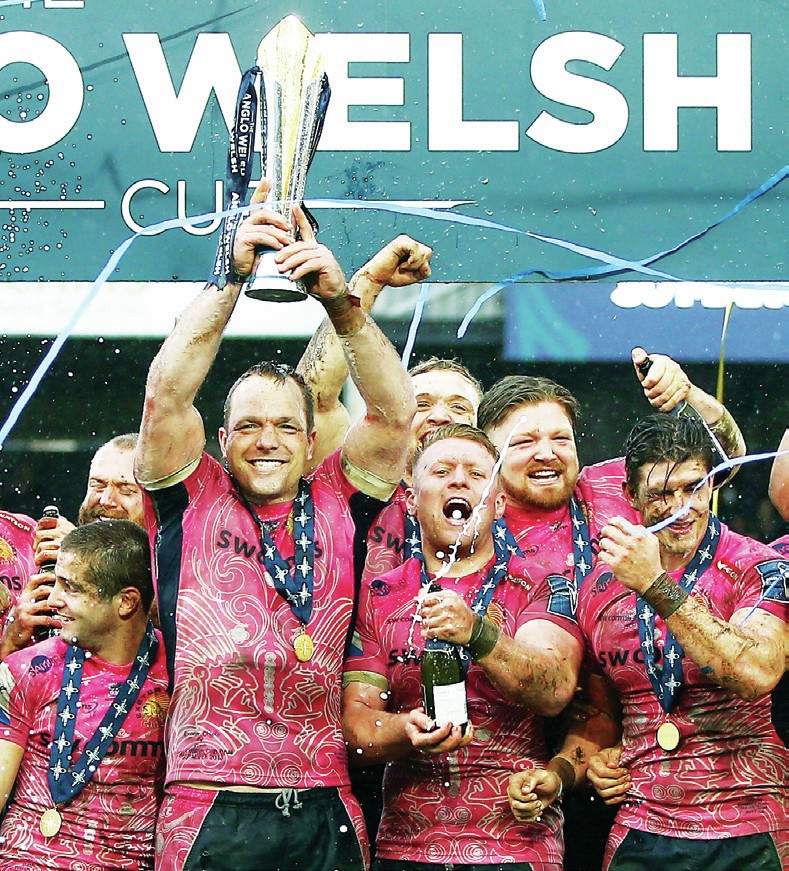Rugby Matters by Brendan Gallagher – A weekly look at the game’s other talking points

Eyes down all you pub quiz fiends, it’s quiz time and your specialist subject is Anglo-Welsh rugby competitions.
Your questions come in three tranches and it’s an automatic red card if you employ google or phone a friend.
1: Who were the last winners of the Anglo-Welsh Cup, who did they beat in the final and what was the attendance?
2: During the last eight years of the Anglo-Welsh cup finals, which Welsh teams reached the final?
3: Who were the first winners of the Sunday Telegraph English-Welsh Merit Table in 1965? And which Welsh team won three consecutive titles in the mid-80s?
Anglo-Welsh Cup History
That’s got the old grey matter working hasn’t it so let’s put you out of your misery.
First, Exeter Chiefs were the last Anglo-Welsh Cup holders defeating Bath 28-11 in front of an 8,074 crowd at Kingsholm in 2018.
Secondly, precisely no Welsh club reached the final in the last eight years of the competition’s history which ranged, in various forms and under different sponsors, from 2005-06 season to the 2017-18.
And thirdly mighty London Scottish were the first winners of the Sunday Telegraph English Welsh Merit during the 1964-65 season, a competition which ran until 1989 with the Daily Mail occasionally picking up the sponsorship. And the Welsh team that won three titles on the trot were Pontypool.
Merit Table
The Merit Table was an extraordinarily random piece of old nonsense.
Some teams would play half the number of games that others contested; some teams would have a demonstrably weaker fixture list, a B circuit if you like, while others would have many more home games than away.
Your position in the table depended on your winning percentage.
It was all massively unsatisfactory other than it scratched that itch whereby clubs wanted to somehow be measured against each other and wanted to look on fixtures as something other than just friendlies.
Newspapers and the media were also increasingly unhappy with endless friendlies and sports editors strove to conjure up some pop up League or competition.
I’m thinking some of you, normally fonts of rugby knowledge, will have been scratching around a bit to get off the mark with those questions and that is sort of my point.
I’ve never got the obsession – held by both Unions – that some kind of Anglo-Welsh League/Cup or both would be the panacea for many of the financial woes in our club game.
Literally the first thing the RFU did when the game turned professional was to commission a report, left, in November 1995, on the way forward which immediately made provision for an Anglo-Welsh competition.
Rivalries dissipated?
My sense is that the rivalry simply isn’t there anymore and I speak as somebody who has spent vast chunks of my life reporting on club rugby in both nations and indeed club rugby between the two rugby cultures.
Being the start of a new season the subject cropped up again recently on cue, as it has done every September for the past 30 years or more.
It’s the surest sign that summer is over known to man.
This time allegedly a Prem task force again looked at the idea, the ubiquitous feasibility study, before moving on to the equally unlikely but oft mooted British and Irish League.
The latter might or might not involve dropping the Italian teams or the newly and controversially recruited South African franchises.

I can only think the suits and the CVC moneymen combined a scheduled blue skies evening with an unscheduled all nighter at the Dog and Duck and some minion was deputed to type up a transcript of their warblings the following morning.
Jesus Mary and Joseph and the wee donkey – pray tell me how does a two division British and Irish League or combined Prem/URC work exactly?
How does that improve everybody’s finances?
How can fans afford the travel, how does relegation work from Division Two and how does that not detract from a European Champions Cup that already requires an upgrade and relaunching to regain its former glories.
Getting with the times
The Anglo-Welsh thing at least has some history, toes were plunged into murky waters with attempts to make it work and there was just a moment in 2008 when the Ospreys beat Leicester in front of 65,000 fans at Twickenham to win the EDF Anglo-Welsh Cup final that you wondered if it could not be made to work. But times change.
Yes for decades there was healthy rivalry between a cadre of mainly west country clubs – Bath, Bristol and Gloucester – and some of the Welsh clubs while Leicester, Quins, Moseley and Coventry also used to dive in and out of Wales on occasions and London Welsh fulfilled many fixtures with their countrymen.
But did hordes of away fans attend these games?
I don’t remember that being the case back in the 80s and 90s and most of these games in any case were midweek. Cardiff v Bath was usually a full house but I was surprised one time to see a star studded Tigers attract only a modest attendance at Pooler, and that was a Saturday game.
For a good while English rugby was unhealthily obsessed with Welsh rugby and vice versa.
Let’s say between 1963 – when England won in Cardiff – and 1991 which was the next time England won at the Arms Park.
More often than not the Welsh would also win at Twickenham.
England had no idea how to beat Wales and the Welsh had virtually forgotten how to lose to the English.
It was THE rivalry that defined both nations and that frisson continued at club level.
Didn’t George Crawford once walk off at Rodney Parade because he considered the Newport-Bristol game too filthy to referee.
New Rivalries
But that really isn’t the case anymore. England’s rivalry with Ireland and France is more important, fixtures with the southern hemisphere giants much more frequent.
Welsh rugby – and Welsh club rugby – no longer has that cache and mystique. Indeed I would sadly suggest that English rugby fans are almost indifferent to Welsh club rugby.
There is infinitely more interest in French and Irish teams. And let’s be brutal there are only four senior Welsh clubs now – as opposed to 18 back in the day – and two of those are looked upon as unnatural creations this side of the Bridge.
The Ospreys and Dragons or whatever they call themselves this season, don’t resonate with English fans anymore.
If we could all climb into a time machine and return to say August 1985 and if rugby could be declared professional then – 10 years earlier than it was – there is just a chance an Anglo-Welsh league might have been launched and thrived.
But we are getting into Dog and Duck territory again here. It’s a non-starter and the suits that run our game need to sober up on this one.
Blueprint for the future
The main proposals in the report issued by Rugby Football Union Commission
The 120-day qualification rule will stay in place for this term but be changed to seven days from next season
The Five Nations championship be switched to May from 1997, to be played on Saturdays and Sundays on consecutive weekends
League division two will contain 14 clubs and division three 16, from next season
The top four clubs in division one to take part in a European tournament, with the remaining six playing in an Anglo-Welsh competition
Players’ contracts to be lodged at Twickenham, with cash being channelled through headquarters. Players will not receive any part of transfer fee
A new national disciplinary panel for sent-off players
The main RFU committee to be renamed the Council and trimmed-down executive committee to be renamed the Board of Management
The introduction of a pre-season Charity Shield match between the winners of the Courage and Heineken Leagues
























